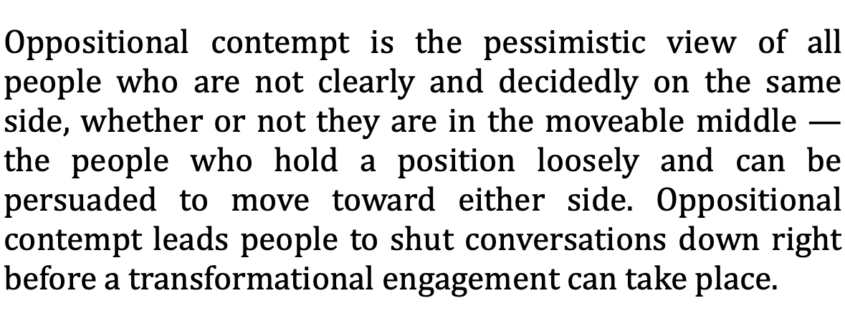Over the past few months, I have been facilitator and participant in scores of conversations. In most cases, they were informal, but generative. They gave attention to issues and root causes, but also invited participants to explore different ways of addressing them that could lead to solutions. Still, it was not unusual for someone to point out that “all we’re doing is talking” or “we need to do more than talk”.
It seems as though people are not only interested in seeing someone else drive action — because they are not taking it upon themselves to do it — but they want to skip the important exercise that is conversation. It is not just about spewing words. Through conversations about human rights, justice, equality and creating change, we are able to build community, learn about each other’s interests and skills, establish trust, share ideas, identify the nonnegotiable matters and collaborate on direct action.
Even in movements that begin with rapid response, conversation plays an important role. Its usefulness is often underestimated and people tire of it quickly. This may be a signal that we need to move toward a different, more fluid form of organising that allows conversations to happen while action is underway, even in the early stages.
There is always frustration about the amount of time change seems to require. It is possible the “change takes time” rhetoric has been a tool to keep us complacent. Maybe it has been an excuse for us to take it easy and do the minimum, thinking that more effort would not bring more reward.
Change can take less time if we have more of the other ingredients. More people, more energy, more action, more dedication, more willingness to be uncomfortable and unpopular. Our desire for change has to be great enough for us to commit to doing the work and our commitment has to be greater than the competing desire for comfort. We have to be more uncomfortable with injustice and inequality than we are with the sacrifice required to wipe them out.
Among our unfortunate comforts is ignorance. Far too many people would rather pretend to know than ask a question, read an article, or watch a video to get to the answer.
Another damaging comfort is what can be termed oppositional contempt. This is the pessimistic view of all people who are not clearly and decidedly on the same side, whether or not they are in the moveable middle — the people who hold a position loosely and can be persuaded to move toward either side. Oppositional contempt leads people to shut conversations down right before a transformational engagement can take place. An example of this is fresh in my mind because I saw what could have been an unfortunate exchange on Monday.
When a question is really a quest for knowledge
Darren shared a post about discrimination against Haitian migrants regarding access to Bahamian citizenship. The post made Darren’s position clear — that children born in The Bahamas should be able to apply for Bahamian citizenship. Whatever your views on the issue, put them aside for now so that you don’t miss the point. Janae replied with questions about what this might look like in practical terms and how we would establish boundaries. Her questions boiled down to:
-
If you designed the system, how would it work?
-
What would be the requirements and restrictions?
Janae was seeking understanding. She could not picture a version of The Bahamas in which the children of Haitian migrants could access Bahamian citizenship. It is likely that, when she tried, she envisioned crowded classrooms and public clinics which is a predictable picture because education and healthcare are the two services Bahamians frequently cry are being monopolised by Haitian people.
She wanted to know how, if we extend these human rights, we would manage our resources in a way that allows us to continue to function at the same level. This basic question is one that governments have to answer all the time. Our government contended with this issue when it implemented a lockdown. With so many people unable to work and receive pay – and with the government’s obligation to provide for its people – how would it be able to meet its other obligations when money has to be spent differently because of the unexpected situation?
These kinds of changes to budget, legislation and policy are infrequent at this scale and level of visibility, but not unheard of. The public is not typically involved in these processes, so Janae’s questions, while possibly frustrating, are not invalid.
Some interruptions are fissures, meant to disconnect
Myrtle came along and decided to intervene with what we like to call “attitude”. She asked a rhetorical question meant to make Janae feel embarrassed for asking a question Myrtle obviously considered offensive. Janae stayed the course, however, and clearly stated that she was not seeking to cause offence, but to get a better understanding of Darren’s point of view.
Myrtle had already successfully derailed the conversation and the next few responses were to questions Janae did not ask. Janae then said that she had seen these conversations before and has never seen anyone propose a solution. She wanted to support Haitian migrants in their fight for human rights, but needed to understand the end goal. She added that, given the limited resources of the country, she would like to know if and how The Bahamas, if it grants access to citizenship, could reasonably state that it can no longer accept applications for citizenship.
Janae’s engagement remained respectful in the face of a toxic politeness — the skillful use of careful tone and wording adopted by someone who knows they are being aggressive and do not want anyone to be able to call them out on it — even when Myrtle came back to tell her she was unfairly burdening Darren with her questions and should seek out an organisation, activist, policymaker or academic instead.
Interestingly, Darren is an activist, personally known to Myrtle and perfectly capable of saying he was not interested in having the conversation. He, however, is a consistent and active participant in these conversations, often starting them on his own. Myrtle noted that she knows Darren and would prefer to engage him and understand his perspective.
Some interruptions are bridges, meant to (re)connect
At this point, Darren stated there was no simple answer and pointed to systemic issues of political and economic exploitation which directly impacts migration, the need for migrant labor and the usefulness of a focus on controlling migration rather than attempting to stop it completely.
These are valid points, but did not quite answer the questions, so it was a relief to see Rufina enter the conversation and deliver seven helpful points which included action steps including regularisation of people already here and a direct challenge to the idea that migrants are a strain on resources. If a standing ovation was possible on Facebook, it would have happened at this moment. Someone read the conversation, saw the questions asked in sincerity, chose not to lambaste or embarrass anyone, and provided thoughtful responses.
We like to believe we are ready for change. That change should not take such a long time. That we spend too much time talking. That we need to get to the action. Somehow, however, we prove every single day that we are not on the same page. We are not prepared to engage one another with respect and share knowledge, even when it is to the benefit of the communities we care about.
The issue of immigration is one example, but there are many other issues on which we do not agree. There have been thousands of conversations that could have resulted in conversation, but participants gave in to oppositional contempt or toxic politeness rather than doing the work — the action — of sharing information and ideas with a person in the middle who could be moved by what they said.
If we are not prepared to properly engage even the moveable middle, then no action we take will be successful. We cannot rush to move when we leave behind the people who make a movement. Conversation matters — the content, the tone and the motivations of the people in it.
To be the smartest, the loudest, or the one with the hardest shutdown should never be the goal. We have to move the middle.










Leave a Reply
Want to join the discussion?Feel free to contribute!